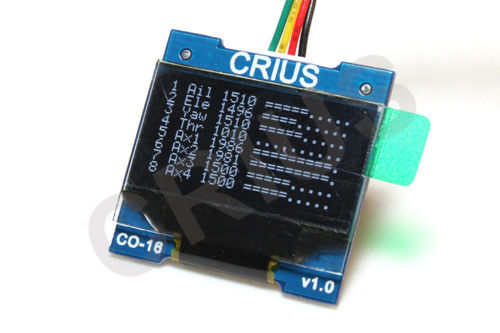a c library with abstraction for small displays
I stumbled across some of these o-LED displays and wondered how to access them on Linux. I started with the I2C Crius which worked fine for me, but the implementation was fully done in Python. Each draw of a pixel resulted in a call of a specific Python function. Then one day I had to use the code on a 400MHz ARM plattform and wasted about 90% of my CPU for the display.
So I decided to move the display and bus functions to a c library and call them later via Python.
- Crius-OLED V 1.0
- you probably need to fix the hardware: http://forum.arduino.cc/index.php?topic=159851.45
- Crius-OLED V 1.2
- Generic SSD1327 - not tested
- Generic SSD1307 - not testet
All you need is cmake and a gcc. Then simply create makefiles with cmake and feel free to compile:
git clone https://github.com/erazor83/libsdisp cd libsdisp cmake . make make install
There are some options to enable different additional features:
- WITH_SHARED - build shared .so file (libsdisp_shared.so)
- WITH_EXAMPLES - build examples
- WITH_SWIG_PYTHON - build python lib
cmake -DWITH_SHARED=ON .
There is even a libsdisp ebuild at http://wiki.erazor-zone.de/wiki:projects:linux:gentoo
For python you should probably also define your desired python target like this:
cmake -D WITH_SHARED=ON -D WITH_EXAMPLES=ON -D WITH_SWIG_PYTHON=ON -DPYTHON_INCLUDE_DIR=$(echo /usr/include/python2*) -DPYTHON_LIBRARY=$(echo /usr/lib/libpython2.*.so) .
#create display context sdisp_t* sdisp_new_crius(uint8_t bus_nr); sdisp_t* sdisp_new_ssd1306(uint8_t bus_nr); sdisp_t* sdisp_new_ssd1327(uint8_t bus_nr); void sdisp_close(sdisp_t*); #display info functions int16_t sdisp_display__getWidth(sdisp_t*); int16_t sdisp_display__getHeight(sdisp_t*); FEATURES_TYPE sdisp_display__getFeatures(sdisp_t*); #display core functions int8_t sdisp_display__init(sdisp_t*); int8_t sdisp_display__test(sdisp_t*); int8_t sdisp_display__clear(sdisp_t*); int8_t sdisp_display__mov_to(sdisp_t*,uint8_t,uint8_t); int8_t sdisp_display__detect(sdisp_t *ctx); #display buffer functions int8_t sdisp_display__buffer_draw(sdisp_t *ctx); int8_t sdisp_display__buffer_clear(sdisp_t *ctx); int8_t sdisp_display__buffer_test(sdisp_t *ctx); int8_t sdisp_display__buffer_set_pixel(sdisp_t *ctx,uint16_t x, uint16_t y, uint8_t color); int8_t sdisp_display__buffer_set_pixels(sdisp_t *ctx,uint16_t start, uint16_t len, uint8_t* color);
The library is meant as a speedup for python and includes (if enabled) a swig module.
In Python things would look like this:
I2C_BUS=7 import sdisp sdisp_ctx=sdisp.sdisp_new_crius(I2C_BUS) sdisp.sdisp_display__init(sdisp_ctx) #set buffer content to 0 sdisp.sdisp_display__buffer_clear(sdisp_ctx) #fill buffer with internal buffer image sdisp.sdisp_display__buffer_test(sdisp_ctx) #display buffer sdisp.sdisp_display__buffer_draw(sdisp_ctx) sdisp.sdisp_close(sdisp_ctx)
Some arguments have been abstracted to better fit Python:
int sdisp_display__buffer_set_pixels(sdisp_t *ctx,int start, list pixels);
GNU General Public License, version 2
